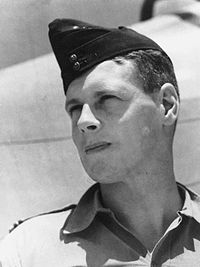
Back ويلفريد آرثر Arabic ويلفريد آرثر ARZ Wilfred Arthur French Wilfred Arthur ID Wilfred Arthur Portuguese
Wilfred Arthur | |
|---|---|
 Wilf Arthur in Palestine, June 1941 | |
| Nickname(s) | "Woof", "Wolf", "Wulf", "Bandy" |
| Born | 7 December 1919 Sydney |
| Died | 23 December 2000 (aged 81) Darwin, Northern Territory |
| Allegiance | Australia |
| Service/branch | Royal Australian Air Force |
| Service years | 1939–1946 |
| Rank | Group Captain |
| Service number | 565[1] |
| Unit |
|
| Commands held |
|
| Battles/wars | World War II |
| Awards | |
Wilfred Stanley Arthur, DSO, DFC (7 December 1919 – 23 December 2000) was a fighter ace and senior officer of the Royal Australian Air Force (RAAF) during World War II. Commonly known as "Woof", he was officially credited with ten aerial victories. As a commander, he led combat formations at squadron and wing level, becoming at twenty-four the youngest group captain in the history of the RAAF.
Born in Sydney and raised in rural Queensland, Arthur enlisted in the RAAF the day after Australia joined the war in September 1939. He first saw action the following year with No. 3 (Army Cooperation) Squadron in the Middle East, flying Gloster Gladiators initially, and later Hawker Hurricanes and P-40 Tomahawks. He achieved victories in all three types against German and Italian opponents, and was awarded the Distinguished Flying Cross for shooting down four aircraft in a single sortie in November 1941. The next month Arthur married a young woman he met in Alexandria, and organised for her to travel with him on his troopship when he was posted back to Australia in January 1942.
After a brief stint flying P-40 Kittyhawks with No. 76 Squadron in Queensland in April 1942, Arthur served as an instructor with No. 2 Operational Training Unit (OTU) in Victoria. In January 1943 he was posted to New Guinea to command another Kittyhawk unit, No. 75 Squadron. He received the Distinguished Service Order in April for continuing to lead an attack on a formation of Japanese bombers after discovering that his guns were inoperable. Appointed wing leader of No. 71 Wing, Arthur was involved in a runway collision with an RAAF Spitfire in November and suffered severe burns necessitating repatriation to Australia. After recovering, he attended a staff course before taking charge of No. 2 OTU. In December 1944 he was posted to the Dutch East Indies to command No. 81 Wing and, later, No. 78 Wing. Twice mentioned in despatches during the war, Arthur also played a leading part in—and gave name to—the "Morotai Mutiny" of April 1945, when eight RAAF officers attempted to resign their commissions in protest against apparently worthless ground-attack operations. Pursuing business interests in Australia and Vietnam following his discharge from the RAAF after the war, he settled in Darwin, Northern Territory, in 1967 and died there in 2000.
- ^ "Arthur, Wilfred Stanley". World War Two Nominal Roll. Department of Veterans' Affairs. Retrieved 1 March 2023.